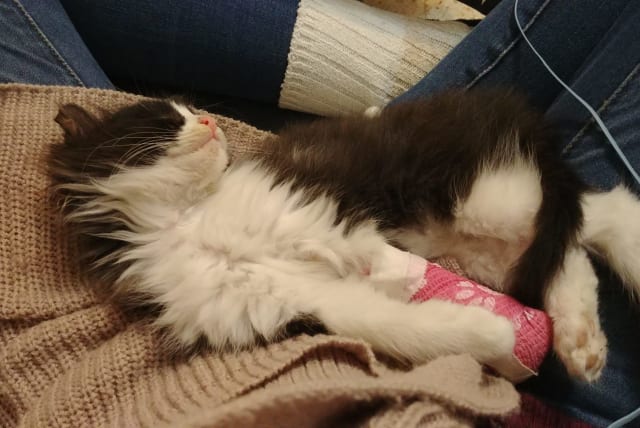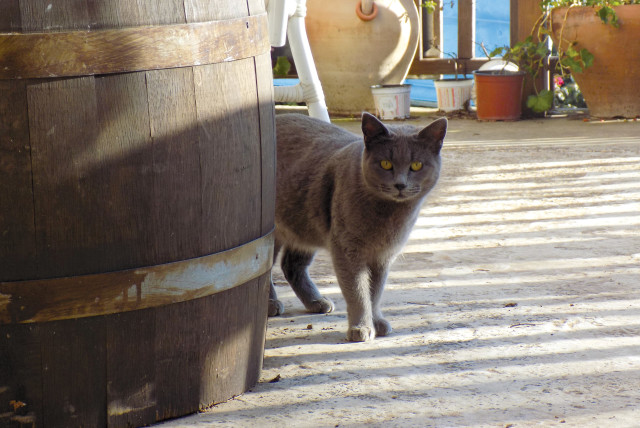Jerusalem street cats: Lending a helping paw to feline friends

Jerusalem street cats, a pest to so many, are actually living beings struggling to survive. One initiative has tried to help by bringing volunteer veterinarians.
In recent years, the practice of combining a holiday with volunteer work and helping to make a difference alongside relaxing has soared in popularity. This trend has not escaped Israel. One such initiative is Vets for JSPCA (Jerusalem Society for the Prevention of Cruelty to Animals) Israel.
Vets for JSPCA Israel was founded in 2019 by Hindy Pearson, a Canadian living in the UK, who had previously lived in Israel and was aware of the terrible plight of the street cats in Israel. Street cats are not an uncommon sight in Israel, particularly in Jerusalem, where it is estimated that there are 200,000 of them. While there are kind people who feed the cats, in certain areas there are far too many for them to help, and many of the street cats are starving and have to rely on sourcing food that has been thrown out.
Prior to this, Pearson knew little of animal welfare but had always walked around with cat food in her bag when she lived in Israel so that she could feed any cats that she encountered on the streets.
In 2019, after not having visited Israel for 27 years, as she couldn’t cope with the tragic sights of the street cats fighting to survive, she and her husband decided to visit on the condition that she would be able to do more to help the street cats than just walk around feeding them. There is a desperate need to help reduce the number of street cats that risk starvation, illness, being run over or abused.
After speaking to many people involved in helping street cats in Jerusalem, a city that she is familiar with, Pearson discovered that while TNR (trap, neuter and release) schemes to trap, spay or neuter and then return the street cats to their environment do exist in Israel, there is a shortage of funds and veterinarians willing and able to work in a spay-neuter clinic on a regular basis. It soon became clear that a tailored support campaign was required to address this problem. TNR programs reduce the breeding of more litters of unwanted kittens desperately trying to survive on the streets, and they make the existing street cats healthier.
One of the people that Pearson spoke to was Eve Beili, a longtime volunteer with the JSPCA. Thus Vets for JSPCA Israel was born. Vets for JSPCA Israel brings out veterinarians from other countries to assist in spay and neuter clinics, thus relieving the burden on vets here, while helping to reduce the street cat population. New veterinary graduates are not accepted, and experience with spaying and neutering is preferred; but otherwise, any overseas veterinarian is encouraged to apply.
The vets, who often combine volunteering at clinics with exploring Israel, pay for their own flights to Israel, but Vets for JSPCA Israel pays for their accommodation during the period that they work if they volunteer for a minimum of a week. It also provides transportation to and from the airport and the clinic and pays for their lunch on workdays.
Bringing volunteer veterinarians to help solve the plight of Israel's street cats
Pearson began posting on two Facebook groups designed for vets who want to volunteer overseas – Veterinary Volunteer Missions Abroad and Veterinary Volunteering – and received 50 expressions of interest.
However, COVID then hit, which delayed the start of the program until July 2022 when the first vet finally arrived. Since then, six more vets have come, with two more signed up for July. The vets, who came from the US, Netherlands, UK and Switzerland, work with Israeli vets at the JSPCA clinic and enable them to help more street cats than would otherwise be possible. Two of the vets have already expressed an interest in returning.
The vets are not expected to fundraise but are encouraged to take photos and spread the word among other vets who may be interested in participating. Pearson also set up a Vets for JSPCA Facebook page, where she regularly publishes photos of the cats that have been helped, alongside encouraging people to donate to the program. As well as recruiting vets, she also assists the JSPCA fundraising department in ensuring that there are continued funds to bring out more vets.
In addition to paying for the vets’ board, lunch and travel during their volunteer period, funds are also required to cover expenses such as assistants during surgery, medical suppliers, trappers to trap and return the cats, and cleaning equipment. It costs hundreds of shekels to spay or neuter one cat alone, so attempting to spay or neuter hundreds or thousands of cats is a indeed costly business! Donations can be made through a unique GoFundMe page, Spay and Neuter Feral Cats in the Holy Land or via the JSPCA, a registered nonprofit stating that it is for the Vets for JSPCA program.
While realizing that it is impossible to help every street cat, Pearson is proud that she is able to make a difference in the lives of the cats that have been helped. She says, “Animal suffering doesn’t stop just because you look away. Do something. Volunteer, speak up on social media, and donate to those making a difference.”
As an inveterate animal lover whose heart breaks every time I see a cat begging for food or having to fight to survive on the streets on a daily basis and who walks around with cat food to give street cats that I encounter while walking around, I am glad that such a worthwhile program exists, which undoubtedly makes a difference in the harsh and often too-short lives of Jerusalem street cats and also helps make Jerusalem a better place to live for cats and humans alike. ❖
For more information, to donate or volunteer, contact Hindy Pearson at hindy.jspca@yahoo.com
Jerusalem Post Store
`; document.getElementById("linkPremium").innerHTML = cont; var divWithLink = document.getElementById("premium-link"); if (divWithLink !== null && divWithLink !== 'undefined') { divWithLink.style.border = "solid 1px #cb0f3e"; divWithLink.style.textAlign = "center"; divWithLink.style.marginBottom = "15px"; divWithLink.style.marginTop = "15px"; divWithLink.style.width = "100%"; divWithLink.style.backgroundColor = "#122952"; divWithLink.style.color = "#ffffff"; divWithLink.style.lineHeight = "1.5"; } } (function (v, i) { });

